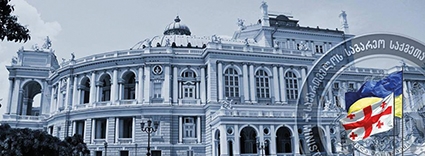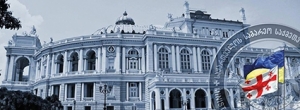Ukraine & Georgia: Time to Team Up?
In five years, the Tbilisi International Conference has built up a grand reputation through its speakers, mostly foreign experts and diplomats from the US and European countries. This year, each took the opportunity to emphasize its full support to Georgia’s democratic development, to its Western orientation and to its territorial integrity (minus the comment of the former NATO Secretary-General Anders Fogh Rasmussen regarding the possible exclusion of Abkhazia and South-Ossetia from the integration process to NATO).
This last would indeed be a way out of the current blockade, but even if, internally, Georgia could come to an agreement, NATO members should also find a consensus regarding the integration of Georgia- something which is not risk-free for the Alliance, nor for the region. President Vladimir Putin told Fox News last year that Russia would react “extremely negatively” should Georgia or Ukraine join NATO.
The timing doesn’t seem so right on the international stage either, with some European countries making efforts to restore political dialogue with the Kremlin. On September 9, the same day as the opening of the conference, the French Minister of Foreign Affairs M. Jean-Yves le Drian was visiting his counterpart in Moscow for the first Russian-French Security Cooperation Council in five years. He noted that “The time has come, the time is right, to work towards reducing the distrust between Russia and Europe, who ought to be partners on a strategic and economic level."
In this context, Georgia’s voice alone may not loud enough to be heard in the international arena. This is a concern that was underlined by several speakers at the conference. However, it could actually be an opportunity for Georgia and Ukraine to enhance their cooperation and push the issue of the Russian occupation higher up the European agenda.
Lately, Europe has indeed been rather ambivalent. In June, the Council of Europe decided to restore Russia’s voting rights despite the fact that the reasons for its exclusion, namely the annexation of Crimea in 2014, remain unresolved. The resolution was presented as a step forward in protecting human rights in Russia, as it gives Russian citizens the opportunity to appeal to the European Court of Human Rights.
Interviewed on the margin of the Tbilisi International Conference, Natalia Arno, a Russian human rights activist based in the US, disagreed with this position. “Even among human rights activists in Russia, the decision was not welcomed, because the regime did not do anything to deserve this gesture. In fact, the situation within Russia is no better: human rights violations are on the rise and on the international stage, Russia has not made any substantial changes.”
“It is not sending the right message to the Kremlin and may encourage Russia to continue violating human rights and international law,” she adds.
Invited to the Conference, the Ukrainian politician Svitlana Zalishchuk, who was part of the Ukrainian Delegation at the Council of Europe, notes that “it delegitimizes any decisions from the CoE, especially since the decision to suspend Russia’s voting right was made because of serious war crimes.” During a panel on the Ukrainian situation, she expressed her concerns regarding the new political strategy of some European countries, France among them.
“President Macron said that the enemy of our friends is not necessarily our enemy. It was a turning point for me in the trajectory of the European project because the EU and NATO are both relying on the opposite strategy to solidarity, and this is how these two projects have survived to date, with success. The direction proposed by President Macron won’t lead to anything but the weakening of the European project,” Zalishchuk claimed.
“History speaks for itself,” she added during an interview. “There was the Obama policy of ‘reset’ with Russia, but it only brought war in Ukraine and war in Georgia.”
If European countries are softening their politics towards Russia, it could then be crucial for Ukraine and Georgia to strengthen their solidarity in front of the Russian occupation.
Zalishchuk confirmed, “There are many opportunities for Ukraine and Georgia to work better together within the framework of the Eastern Partnership, but also in exchanging know-how in terms of democratic development. We are not just fighting against Russia but also for our national success.”
During the same panel, James Nixey, researcher at Chatham House, noted that from his external perspective and experience, there is a lack of coverage of the Ukrainian and Georgian questions in the US. He argued that Ukraine and Georgia should further reinforce their cooperation in order to make their voice louder on the international stage, and to push their priorities to the top of the diplomatic agenda of their European and American partners.
It also echoes to the proposition of the Ukrainian President Volodymyr Zelensky to Georgian President Salome Zurabishvili during their last meeting on September 2. He offered to create “a joint strategy with Georgia on how to combat the Russian occupation and help both countries become members of the EU.”
However, with former President Sakaashvili, leader of the Georgian opposition, back in Kyiv, this might be a controversial position for the ruling elite. Hence, although strategic and praised by international experts, teaming up with Ukraine remains a matter of internal politics, which enters a complicated phase ahead of the parliamentary election in October 2020.
By Lorraine Vaney












